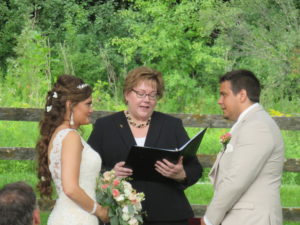Humanist EDge: First Face of Humanism: A Celebrant’s Responsibility

Wedding season is beginning here in Minnesota as the snow melts and temperatures rise. As a humanist celebrant, I collaborate with couples seeking a humanist, secular, or otherwise non-religious ceremony. The ceremonies are written for each couple to reflect the love they have found together, to honor the commitment they’re making in marriage, and to celebrate the bright future in front them.
Celebrant work is a second career for me, following nearly three decades in corporate America. I find this work so much more fulfilling as I have the privilege to work with clients at some of the most significant moments in their lives. Helping them see the various possibilities available and collaborating with them to create the ceremony they want is truly meaningful work. I’ve been told by many couples, “We didn’t know we had any options for a secular ceremony beyond a courthouse wedding.”
While it’s great to be a part of happy wedding days, supporting families as they grieve the loss of a loved one and seek to honor them with a meaningful, humanist memorial service or celebration of life feels even more important to me. I’ve had the privilege of “meeting” some truly amazing people only after they’ve died. Learning about them from their loved ones, hearing the stories and cherished memories, and crafting a service that honors all aspects of the person’s life is both a great responsibility and a great honor.
Humanist celebrants provide ceremonies across the life cycle, including baby welcomings, coming-of-age ceremonies, memorials, and more. Newer kinds of ceremonies, including for divorce, transgender naming, or for welcoming a child with disabilities are being developed as celebrants expand offerings to meet society’s expanding needs. The rising number of religiously unaffiliated people in the United States means the demand for secular ceremonies is increasing, and humanist celebrants are uniquely positioned to meet this need. Serving as a humanist celebrant is a wonderful way to give back to the humanist community, and to promote humanism through visibility and action. We’re often the first face of humanism clients seeking secular or non-religious ceremonies see. That’s a tremendous opportunity, but also puts significant responsibility on the shoulders of humanist celebrants. We deal with people at some of the most important and memorable but also vulnerable moments in their lives, and need to offer a professional level of service that is consistent with the tenets of humanism and the code of ethics we sign.
But not to worry, the American Humanist Association’s Center for Education has a variety of offerings to enable celebrants to increase their skills and knowledge. In-person celebrant training sessions are small-group sessions led by an experienced celebrant. Ceremonies of all kinds are covered in the six-hour class, and participants leave with a reference handbook filled with ceremony snippets, samples of contracts and questionnaires, and much more. In-person training sessions are offered multiple times each year in locations across the country. If you aren’t able to attend an in-person training session, the online modules covering Weddings, Memorials, and End of Life Preparations (more to come) are another opportunity to increase both skills and knowledge. These courses offer great information in the convenience of your home on your own schedule.
Whether you’re considering becoming a celebrant or already endorsed by the Humanist Society, you can be confident that there are many avenues available for you to learn and enhance the skills you’ll need for this very rewarding work. I also encourage celebrants to connect with each other during the Humanist Society quarterly teleconferences so we can support each other as we support our growing humanist community.
I wish you all a happy wedding season.
